Linear TV has become unfashionable.
That is according to industry analyst Brian Wieser, who last week expressed a lack of optimism about the future of TV advertising, unless it reacts adequately to rising digital popularity.
Speaking with Adwanted Events director Justin Lebbon at The Future of TV Advertising Global conference in London last Tuesday, Wieser explained how TV was a declining medium despite studies continuing to show its apparent effectiveness.
“It’s always been the case that there’s a subjective element around why a medium works or doesn’t work, in terms of capturing budget share. Marketers buy into a vision about what a medium can do and they organise their activities around it,” he said, adding, “Torture data long enough and it’ll tell you anything you want it to.”
He then implored the audience of TV marketers to ask themselves why radio was in a “terrible position and will never grow again.”
“Marketers never even think about [radio] despite all the effectiveness studies that are out there. They don’t organise their businesses around the way that radio is organised. They don’t develop creative campaigns to maximise what radio can do. Understandably, because there’s something better than radio for most goals that they have.”
Historically, television has been that “better medium,” said Wieser, but now digital has come to supersede TV.
Podcast: The future of TV is… anxious?
He added that marketers want to be seen as spending on digital because it seems to be credible. Digital has key performance indicators (KPIs) that are easier to define and build credible models around.
That does not mean that TV does not have any fashionable elements, but they are digitised, such as with connected TV (CTV), according to Wieser, and therefore TV should consider redefining how it sells itself to offering high-quality “video” instead of television.
And yet, said Wieser, TV has been resistant to changing its growth strategy to embrace the likes of YouTube and TikTok to become more fashionable in the eyes of advertisers.
“It doesn’t matter if you think subjectively [YouTube and TikTok offers] lower quality content, that is beside the point. It’s [still] video.”
He went so far as to suggest that TikTok likely does not even want to be considered the same as TV so as not to be “dragged down” by the medium’s lack of fashion.
‘You will unleash a tidal wave of really dull, really annoying performance-marketing-type advertising’
The next day, effectiveness expert Peter Field took the stage in direct contradiction of Wieser’s notion that TV must embrace the popularity of performance-led digital advertising solutions.
In a barnstorming presentation, Field was emphatic in his defence of TV. “It is still so endlessly goddamn effective,” he said.
Citing data from Amplified Intelligence and System1, Field explained how TV is exceptional at driving attention and, therefore, mental availability, when compared to its digital counterparts, especially social media. Sure, TV is perhaps more expensive to buy, but marketers who are “chasing cheap” are not fairly considering the value proposition of a high-attentive environment, Field argued.

He further pressed that TV is among the best options for placing emotional campaigns, and that it is a highly trusted medium, which provides downstream benefits for ad effectiveness.
Field also suggested TV was exceptionally effective at brand building toward improved pricing power, and that for brands looking to defend and grow their pricing power, a media plan that gives up to 80% of budget to TV would be most effective.
More generally, Field said the most profitable campaigns spend half of their budget on TV.
He expressed concern that chasing bottom-funnel performance marketing through new digital TV opportunities would necessarily lead to a loss in quality of advertising, which in turn would lead to a decline in attention paid to such ads and thus the capacity for ads to effectively drive long-term business outcomes.
“If you go down [the performance route], you will unleash a tidal wave of really dull, really annoying performance-marketing-type advertising in commercial breaks amongst your viewers. And if there is one way that you can kill attention levels in an ad break, it’s to run that kind of crap.”
Peter Field: ‘Any sensible marketer would be crazy to walk away from TV’
‘Digital advertising will bury television’
Was Wieser convinced? He returned on Wednesday to speak again with Lebbon, and expressed appreciation for, but scepticism of, Field’s argument.
Highlighting the reality of digital performance’s popularity among marketers despite the effectiveness research of the likes of Field, Wieser said, “Effectiveness is nice, it’s an important qualifier for why you spend money […] but marketers have shorter-term pressures around performance.”

TV has its own branding problem, said Wieser, because it is not perceived as driving performance, especially by newer, digital-native brands.
He suggested TV networks will need to adapt their business models to the declining market and should begin to focus on developing subscription services, akin to newspaper publishers.
To demonstrate his point, Wieser removed his shoe and held it up to the audience.
“Digital advertising will bury television as it’s been historically defined,” he said.
The shoe had dropped.







